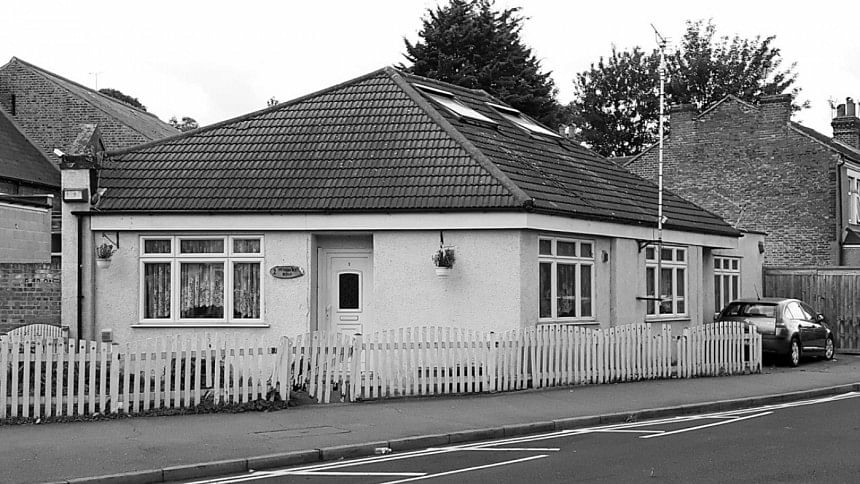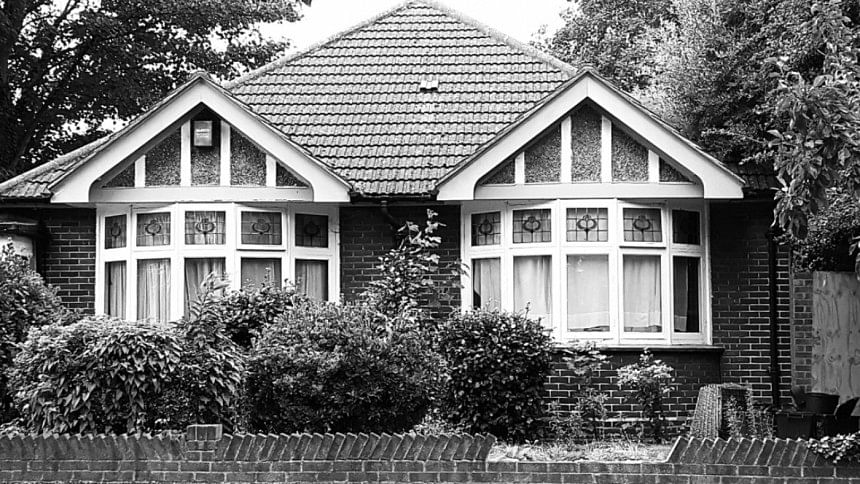In Search of My Nanna's Bungalow

Last weekend I went in search of my Nanna's bungalow. Seventy years ago, during World War II and in the years just after it, my mother and I had stayed with her mother in her bungalow in Erith, a small Thameside port, now part of Greater London. I had never been back and was curious to see if it still existed and was anything like my memory of it.
My Nanna's bungalow. What possible interest could this have for readers of the Dhaka Daily Star? Well, perhaps a linguistic smidgen. Nanna is not, as it may seem, an English corruption of the word Nanima but, as we all know, bungalow is impure and simple bangla.
Three hundred years ago, English sailors sailing out of Kentish ports like Erith took bats and balls with them to play cricket when they made landfall in India. In exchange, they brought back to Blighty news of the particular sort of cottages to be found in Bengal.
For the record, I did find my Nanna's bungalow still standing as I remembered it and still bearing the name she gave it: Glan-yr-Afon, Welsh for 'the bank of a river.' And then, as a huge bonus, I found a second bungalow built by my Nanna: her Bungalow Café. This I had never seen as a child: she had sold it before I was born.
My Nanna had no personal connection with Bengal. The daughter of a Plymouth trawlerman and an Essex herb-seller (working class people couldn't afford doctors), she had grown up in Thanet, an island on that corner of East Kent where the Thames flows into the Channel. Though known for its eccentric snowfalls in winter, it was full of summer season seaside resorts that, in late Victorian times, witnessed Blighty's first big boom in bungalow building. I can only assume it was in her childhood that my Nanna first developed her desire to have abungalow.
A bungalow, that most modest of homes, perfectly suited my Nanna. Even when she was doing well enough to pay the (still extant) Erith Working Men's Club £45 for the land on which to build her café, she lived frugally: in her kitchen cupboard at the time of her death there was simply a piece of hard cheese on a tin plate. Her one luxury, as a skilled needlewoman, were the dainty muslin coverson the tops of jugs and bowls and the lace doilies beneath them: these too, it now occurs to me, were a legacy from Dhaka.
The architect's plans for my Nanna's bungalows are still in our attic. They record there was a problem getting permission for the bungalow she wished to build and move into after her husband's death in 1928. Technically the street where she proposed to build it did not exist since for a street to exist there had to be houses already upon it.
Although the road was there and was very important since it provided the only access to the parish church, Christchurch, the only two houses standing opposite it on the other side of the short road where Nanna wanted her bungalow had their frontages onto adjoining roads. Ergo: no street existed. R.K. Narayan would have worked up a good Malgudi story out of that.

My Nanna was an excellent cook: her meat pies and fruit cakes not even Haji Nanna could have bettered and it was a shrewd move of hers to have opened a café as a way of making a living after her husband's retirement. Equally shrewd to have gouged out a corner of land belonging to the Working Men's Club for her capitalist enterprise.Alsorather ironic.
Nanna's carpenter husband Will, twenty-five years her senior, was a trenchant socialist: atheist, republican, pacifist. The Club was his base. First Labour Councillor to be elected to the Kent County Council, one hundred years ago he fought the notorious Coupon Election of 1918, when the Tories and Liberals ganged up, on the Labour ticket.
At every meeting, the accusation was hurled at Will that, throughout World War I, notably when he sat on Tribunals, he had steadfastly upheld the right of all conscientious objectors to refuse conscription. That he had his hat knocked off whenever he remained seated while the National Anthem was played was a mere detail.
The irony is my Nanna's views were diametrically opposed to his in every respect. After their marriage in 1910, Will, a committed feminist, encouraged my Nanna to join him in public life and this she did, though voting against him on many of the issues raised on the local Urban District Council to which they were both elected. It was said of them that they lived happily ever arguing.
What both had in common was a commitment to raise the quality of public life in Erith and they fought hard to ensure the community had decent public amenities: a hospital, a library, schools, parks.Both served as Justices of the Peace, my Nanna eventually becoming the first woman Chair of her Bench. For none of these public services were they paid.
The church hall behind Christchurch where I can remember my Nanna directing hundreds of volunteers in Civil Defence during the bombing in the War is still there. The community she and Will had worked to create stood firm, so much so that most of the local schoolchildren evacuated to the safety of Wales made their way home, amusingly enough leaving their teachers stranded in Wales.
Sadly, madly in the 1960's, urban developers succeeded where the Luftwaffe had failed in destroying the historic centre of an old waterside town. Except for the riverside frontage (no longer viewpoint as I knew it for watching the world's shipping sailing to and from the East India and West India Docks), all else was unrecognizable to me.
A few listed buildings remain, including the library which my grandfather had argued for in spite of his socialist principles (funds for it provided by the capitalist Andrew Carnegie) and where my mother got her first job. Not that it is a library any more. From the new town centre, as a straggle of bus-stops is euphemistically called, buses head out for Bluewater and Thamesmead.
Bluewater is a nearby "Shopping and Retail Destination" with a newly-opened "Urban Beach" advertised as saving you from having to go down to the real sea-side where my Nanna grew up. Thamesmead is hardly further away than the site of the Bungalow Café: a new housing development on the riverside Belvedere Marshes where those original exiles from India, the misnamed 'Gypsies,' more properly Roma, encamped when I was a boy.
My grandfather admitted that the biggest mistake of his political life was to allow working men's houses to be built down on those marshes. "One day they will be flooded," he said. Thamesmead, apparently so solid compared with (say) Barisal, stands to face a day of reckoning as the globe warms up.
At least, in this corner of a foreign field, two naturalized banglas have survived.
John Drew, an occasional contributor to The Daily Star, is surprised to find a Bangla angle in an unexpected corner.

 For all latest news, follow The Daily Star's Google News channel.
For all latest news, follow The Daily Star's Google News channel. 



Comments